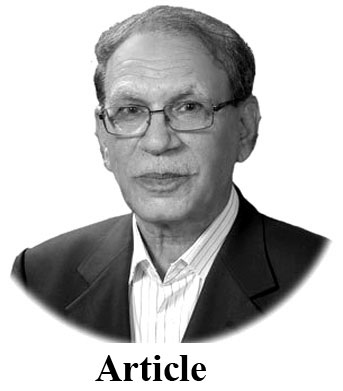Mohammad Jamil
Though many countries of Asia, Africa and Latin America remained under Martial Law more than once; and elected and military governments were back and forth, many writers have the penchant for criticizing Pakistan for three Martial Laws in the past. They do not appreciate that since 2008 three elections have been held, and independent observers confirmed that elections were fair and transparent; parliament is functioning and judiciary is independent, yet they choose Pakistan as an easy prey. The New York Times published Aqil Shah’s article captioned ‘How Pakistan’s Politicians Help the Military’ on 23 January 2020. He is the author of “The Army and Democracy: Military Politics in Pakistan”, which was published in 2014. Anyhow, in his above article he criticized the role of politicians in helping military especially with regard to the law for making appointments and extensions to chiefs of the armed forces.
The author wrote: “Since its foundation in 1947, Pakistan has spent more than three decades under military rule. Even when out of power, the military has exerted behind-the-scenes influence to maintain its firm grip on politics and national security”. It is true that whenever Martial Law was imposed in Pakistan, mainly due to the internecine conflicts of the political parties. Of course, judiciary in the first place, and then politicians who jumped on the dictator’s bandwagon had provided legitimacy to the dictator. The learned author ignored another factor that led to predominance of military over other institutions i.e., role of the US and the West. Pakistan at the time of its inception had faced financial crunch and also needed arms for its armed forces; and British-trained bureaucracy persuaded the governments to enter into defence agreements with the West.
That was the time when Communist China had completed successful revolution and the US wanted an ally to look after its interests in the region. After Liaquat Ali Khan’s visit to the US, Pakistan signed an agreement for purchase of arms from the US in December 1950. After his martyrdom in October 1951, bureaucracy was in full control under Ghulam Muhammad, and called the shots. Immediately after independence in 1947, Pakistan’s apprehension about the designs of a hostile large neighbor India, tried to develop friendly defence relations with US and later China. In the very early stage, politicians lost the control of defence related matters due to their lack of experience and constant squabbles. This allowed the British trained bureaucrats and military officers to take control of the affairs especially those related to defence. In fact, efforts continued with the start of Vietnam War in 1954, whey Ayub Khan had visited the US.
People of Pakistan were against the US during Korean War and the Vietnam War, and there is a perception that Ayub Khan promulgated Martial in October 1958 with the support of the US and the West – champions of democracy. General Zia-ul-Haq promulgated Martial Law after Soviet forces entered Afghanistan on the request of the then Afghan government; and General Pervez Musharraf Martial came two years before the 9/11 events. It was indeed due to predominantly British-trained bureaucracy, which was neither service-oriented not possessed any in-built accountability mechanism – the two essential features of modern public service, had mishandled the state affairs. Judicial system remained at the lowest ebb, as the centuries-old Anglo-Saxon law did not serve the psychological postulates of the modern times. Though efforts have been made to change the outdated laws, there is a perception that lacunas still exist in the laws.
This is borne by the fact that members of the ruling elite ultimately go scot-free after indulging in corrupt practices. Of course major reason for our national miseries is corrupt unimaginative, wishy-washy and namby-pamby leadership. The nation remembers the ‘last decade’ when two major political parties PPP and the PML-N remained at loggerheads, and formed alliances to get rid of each other’s elected government. Even earlier in 1977, Pakistan National Alliance was instrumental in imposition of Martial Law. Regarding the new law vis-à-vis appointment and extension of army chief and others, the author went on to state: “Since he (Nawaz Sharif) was allowed to travel abroad for specialized emergency medical treatment in November, Mr. Sharif appears to have softened his stance toward the military, presumably under the influence of his younger brother and current PML-N President Shahbaz Sharif, who is not averse to working with the Generals to resurrect the party’s fortunes.
Bilawal Bhutto, the PPP leader, emphasized the need for proper scrutiny of the law, but retreated after citing the party’s inability to affect the outcome given its low share of parliamentary seats. But his father and former President Asif Ali Zardari’s release on bail in an alleged money laundering case in December suggests a tacit accommodation with the military”. The problem is that some politicos do not give due respect to the institutions. True enough, in a democratic dispensation, military leadership has to obey the orders of the elected government, but it has to be borne in mind that throughout the world governments act on the advice of military so far as matters relating to national security are concerned. In Pakistan, some politicos do not wish to give the military leadership the right to give its assessment of threats to internal and external security.
In the US, Britain and even in India – the largest democracy in the world – political leaderships take decisions on the basis of the information provided by intelligence agencies and advice of military leadership. Indian Prime Minister Manmohan Singh had in principle agreed to withdraw from Siachen, but the army prevailed upon the prime minister and convinced him that India would lose strategic advantage and Indian forces would be vulnerable if India withdrew from Siachen.
—The writer is a senior journalist based in Lahore.










